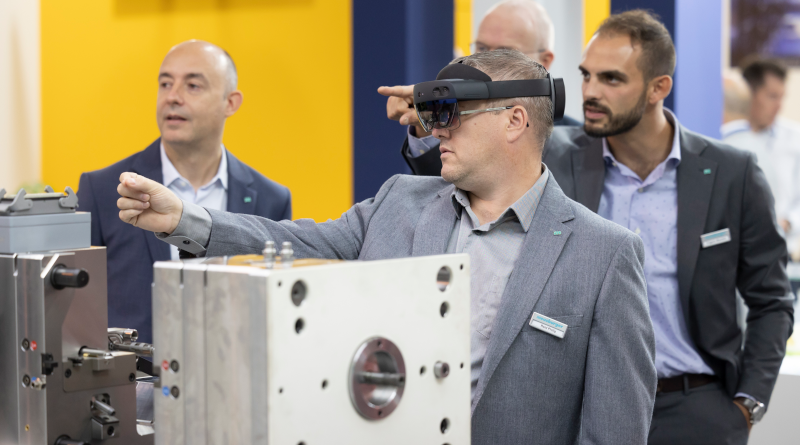How digitalisation and AI advance the plastics sector
based on an article by Dr Cornelia Jokisch, K’ show PR
The plastics industry faces major economic and regulatory disruptions worldwide. Rising competitive pressure, stricter environmental regulations and higher demands made on circularity increase the pressure to innovate.
On-going digitalisation offers new opportunities for producing more efficiently and sustainably. Automated processes, data-based control systems and smart connectivity already ease adaptation to stricter requirements in many companies today. Artificial Intelligence (AI) is considered a key milestone in this. According to a Bitkom study, 78% of the industrial companies polled view AI as decisive for their competitiveness while more than half are waiting to see how others get on first. At the same time, 48% lack the necessary AI skills and 91% demand fewer regulatory obstacles so as not to hamper AI innovations. These figures underline that there is a broad consensus on the relevance of digitalisation but many firms are hesitant to implement it in practice.
Digital key technologies: connectivity and IoT
The digital control and connectivity of machines forms the basis for new technologies. Cyber-physical systems (CPS) and the Internet of Things (IoT) make it possible to capture and evaluate production data seamlessly in real time. Sensors monitor temperature, flow rate or in-mould pressures, for example, and transmit the values to Cloud applications. An important communication standard for this is OPC UA, which makes for safe and cross-manufacturer data exchange. Rising data volumes lead to questions of data use. In the European Union, the so-called “EU Data Act” is one example of how this issue is being addressed. This new Data Act obliges machinery manufacturers to provide machine users with the data generated during operation in a simple and understandable, machine-readable way. At the same time, predictive maintenance moves into focus because real-time analyses can detect deviations early on and reduce unplanned downtimes.
Artificial Intelligence and automation
AI adds new dynamism to digital processes as self-learning algorithms analyse large data volumes and optimise processes flexibly. In addition, machine learning accelerates development cycles and improves process control. Digital twins go even one step further: they depict real production lines virtually and deliver structured data on the complete machinery utilisation. Furthermore, they offer the possibility to save machine data and information in a structured and machine-readable format over the complete lifecycle. Digital twins are said to also comply with the requirements of the Digital Product Passport (DPP), which was introduced with the EU’s Ecodesign for Sustainable Products Regulation (ESPR) entering into force in July 2024. These virtual twins of real manufacturing plants accelerate development cycles and ease maintenance strategies.
Optical quality control & AI-assisted sorting
In the field of quality assurance camera systems and AI-based image processing support manufacturing processes. They detect shape deviations, surface defects or material impurities during production and ensure consistent quality levels. These technologies allow early defect detection thereby reducing rejects and ensuring a more efficient use of resources. In the wake of stricter environmental regulations and rising customer expectations the fitness of plastics for circularity is also moving centrestage. AI-assisted sorting systems with near-IR sensors (NIR) identify different plastic types, separate high-quality recyclates from impurities and improve the recycling quality. This increases reuse rates and contributes to compliance with regulatory requirements. What’s more, digital systems are closely linked with the DPP, which features comprehensive information about the used raw materials, production processes and recycling paths. These technologies support companies in establishing closed material cycles, reducing environmental burdens and complying with the ESPR.
Challenges and skilled labour shortage
Despite numerous flagship projects, progress is stalling in many companies, especially SMEs, due to a lack of investment. Another obstacle is the shortage of skilled staff. Those wanting to introduce automation, AI and IoT technologies require specialists for data analysis and IT security. This staff and skills shortage occasionally slows down implementation even though technical solutions already exist. AR (Augmented Reality) goggles can provide relief here by displaying maintenance instructions or training content right in the staff’s field of vision. This accelerates maintenance and onboarding processes without always having external experts on site.
Summary & outlook
Digitalisation proves to be a catalyst for a more sustainable and efficient plastics industry. Connected production systems make for real-time optimisation thereby reducing rejects rates and buffering market fluctuations more confidently. At the same time, new business models can be developed – in the form of digital platforms and maintenance services.

